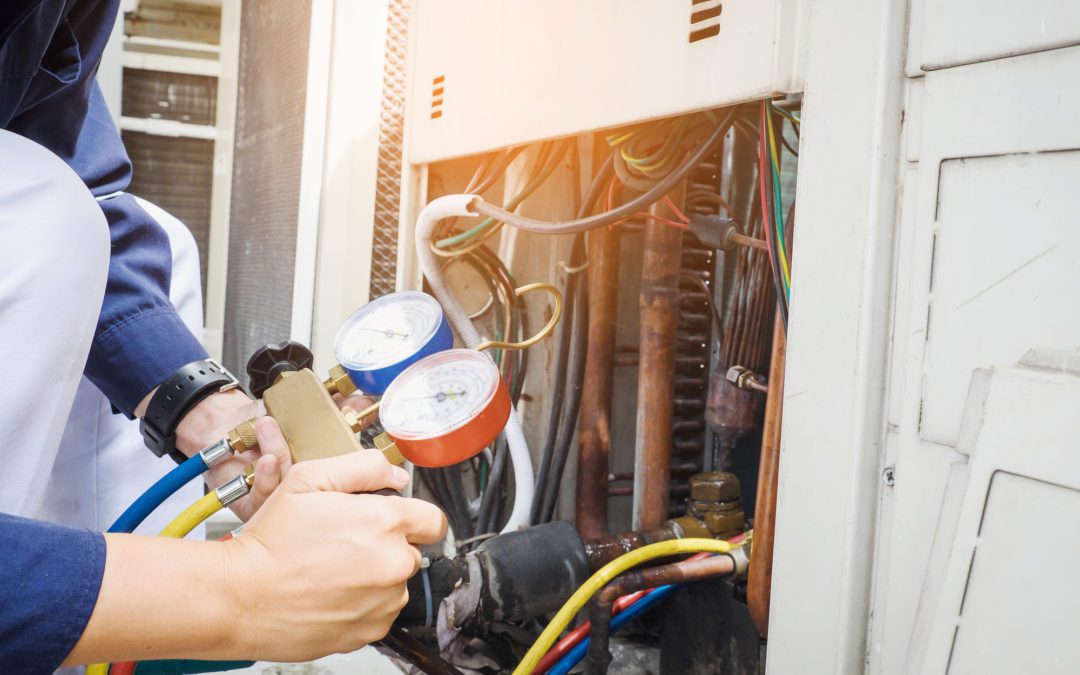What qualifies as an emergency HVAC problem? If you are having a furnace issue, you might be asking yourself this question, wondering whether you should call an after-hours HVAC professional for help or wait for regular business hours to make an appointment. The problem for many homeowners is that telling the difference between a minor furnace problem and a severe HVAC emergency can be easier said than done. In this post, we will run through some of the common furnace issues to give you a sense of how severe the problem might be, how to fix the furnace yourself (if possible), and when to call for emergency assistance.
The Problem: Your furnace isn’t producing heat
Causes of Furnace Not Working
There could be several reasons that your furnace isn’t producing heat, which can range from easy fixes to problems that you should probably call an HVAC technician to resolve sooner rather than later. Common causes could include:
Your thermostat isn’t on.
Perhaps the batteries in your thermostat are dead, or maybe the entire unit has given up the ghost. In any case, if your thermostat isn’t telling your furnace to turn on, then the furnace isn’t going to produce heat. If your thermostat runs on batteries and is dead, try changing them. If it is wired to your home’s electrical system, see the next bullet point.
The breaker is tripped.
A problem with your thermostat or your furnace could be due to a tripped or blown fuse. A circuit breaker issue can disrupt the flow of power to the thermostat, the furnace, or both, which of course means no heat. Resetting the relevant breaker(s) on your home’s fuse box may help restore power and restart your heat. If this option does not bring power back to the thermostat and/or furnace, or if heating comes back briefly only for the breaker to trip again, you may need to contact an electrician to find out why your home’s electrical capacity is being overloaded.
The furnace is dead.
It’s possible that the furnace has simply reached the end of its life, or that some problem is preventing it from working properly. You should consult with an HVAC professional to find out how to fix the furnace, or to learn whether a total replacement is necessary.
If your furnace is producing no heat and you can’t fix the problem by changing out your thermostat batteries or restarting the relevant breakers, the issue likely qualifies as an emergency HVAC problem. Particularly in the colder months, not having heat is a safety issue and potentially even one that can lead to bigger problems later (such as frozen pipes). To be safe, call for emergency assistance.
The Problem: Your furnace isn’t producing enough heat
Causes of your furnace isn’t producing heat:
If you only seem to be getting lukewarm air, or if the airflow coming out of your vents seems unusually weak, the cause could be anything from a clogged filter to dirty ducts or vents. You can solve some of these issues by yourself. For instance, switching out your filter regularly is one of the key pieces of regular furnace maintenance that you can do on your own to keep your furnace running efficiently. Dusting your vents can also make a difference. If the problem persists, though, you should make an appointment to have an HVAC professional look at your furnace and examine your ducts. While there may be a problem with the furnace itself, the problem is more likely due to airflow blockages. You may be due for a thorough duct cleaning to open up the pathway for heated air to be distributed throughout your home.
The Problem: Furnace Smells Bad
The Cause of bad smells coming from your furnace:
A bad-smelling furnace is a red flag that should immediately trigger your emergency response impulses. If you smell gas, for instance, there may indeed be a gas leak. You should leave your home immediately (with all family members and pets) and call your gas utility company to shut off the gas.
If you smell smoke or burning odors, the problem may also be coming from your furnace—perhaps in the form of dust or debris buildups inside the unit itself. Call your HVAC technician immediately to have the unit checked thoroughly.
The Problem: Noisy furnace operation
The Cause of a noisy furnace:
Furnaces can make all manner of different noises, from pops to rattling sounds to bizarre squealing, moaning, or grinding noises. The causes of these sounds can run the range as well. Sometimes, for instance, popping sounds occur as your ductwork expands and contracts due to fluctuations in temperature. These sounds, while alarming and maybe even annoying, aren’t a huge problem. Other noises can indicate loose parts, slipped belts, bust motor bearings, and other more severe mechanical problems. To be safe, you will probably want to consult with your HVAC technician, describe what you are hearing, and ask for their advice.
Conclusion
Any furnace issue can be worrisome, whether because it may pose a safety risk or because it might represent a considerable unplanned expense. If you aren’t sure whether the problem is an emergency, it is best to err on the side of caution and call an HVAC technician for urgent inspection, service, or advice. However, if the issue is something with a simple fix—such as resetting a breaker or changing out a filter—you can give those options a try before making an HVAC service call. You can also avoid most unexpected problems with your furnace by having HVAC maintenance done regularly.

